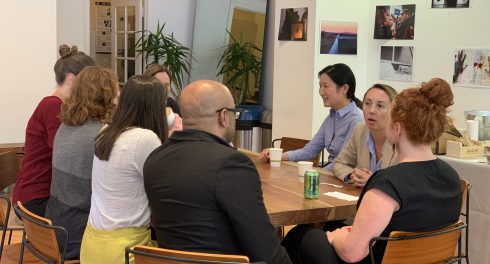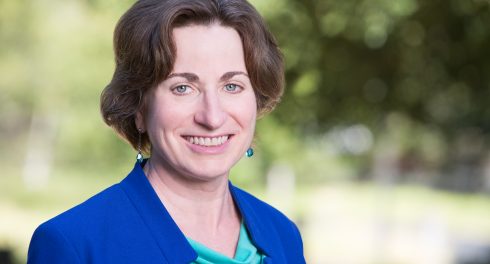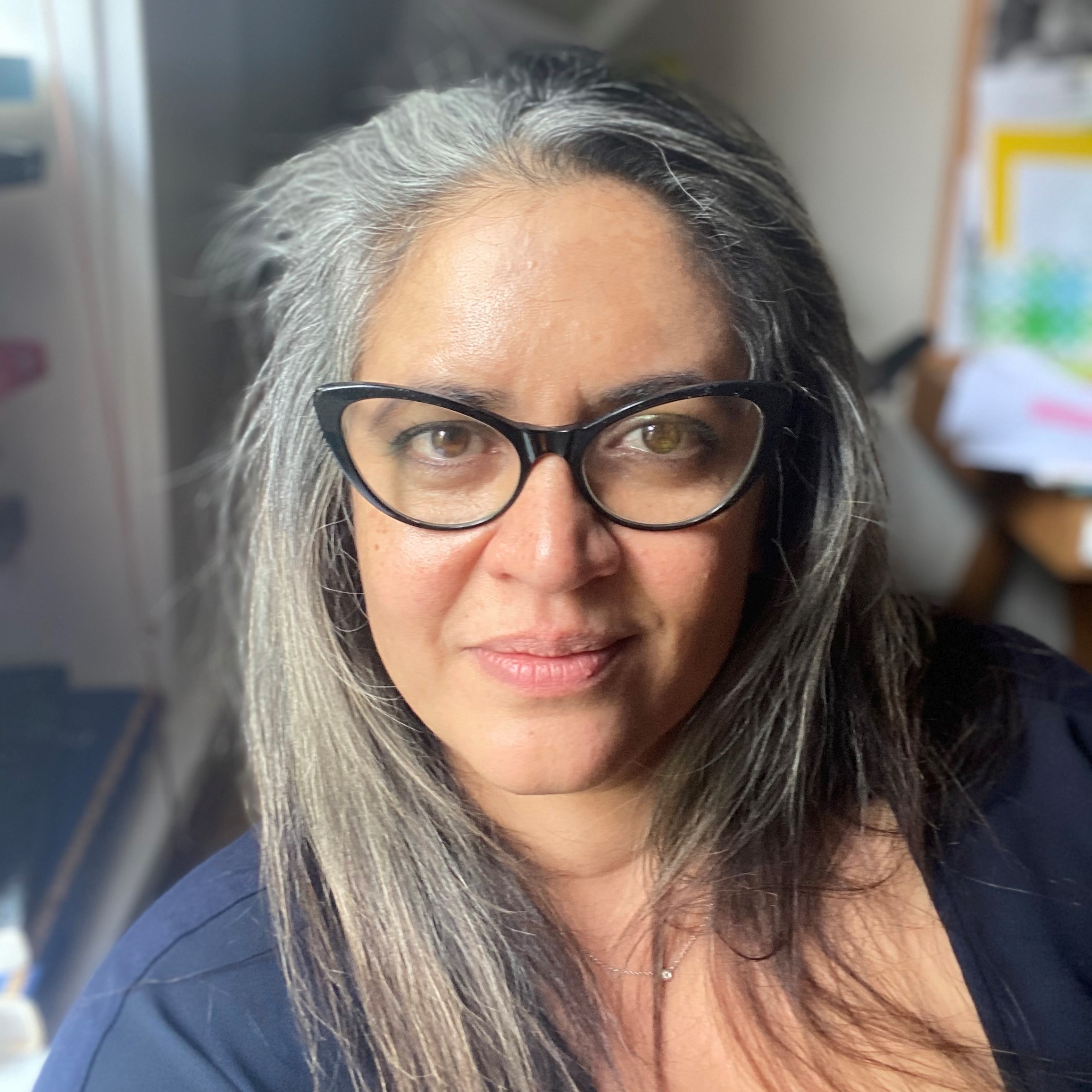
Naomi Hossain
Naomi Hossain is Bangladeshi-Irish, originally from London, but now based in Washington DC, where she work at the Accountability Research Center at American University doing the “most amazing job” – action-oriented research with activists and practitioners, and scholars to help them think through their strategies for holding authorities accountable and share what they are learning. “Through this work, we are getting much clearer on what is – and what is not – possible in terms of building more accountable societies in the global South and how vital it is to hear from those who are doing the actual work on the ground,” says Naomi.
Over the years Naomi has researched elite perceptions of poverty, food and fuel riots, disaster politics, workers’ rights, women’s empowerment, and the role of civil society in development. We recently caught up with Naomi to discuss pushing for more transparency and accountability in Bangladesh, civil society’s role, and how we can all be part of the development process.
What first motivated you to work on transparency, civic participation, and accountability (TPA) issues? Also, why Bangladesh (since most of your work is focused on the country)?
I was always interested in what it really took for citizens to get governments and their agents to behave as they are supposed to. Much of the relations between citizens and states are not visible to ‘the aid gaze’ – development indicators don’t pick them up, evaluation consultants don’t know what to look for, and research is not designed to study the informal relations that really matter. So I guess I was most attracted by these informal and less visible ways people seek to hold their leaders to account.
Why Bangladesh? Because it is the most fascinating place in the world! I have a notion that Bangladesh’s human development successes rest on strong but invisible accountability pressures for its leaders to deliver for the people, rooted in our devastating early history in the 1970s, particularly the 1974 famine. I think political histories tell us a great deal about how much and what kinds of accountability are possible.
Some of your work has explored the paradox of poor governance, corruption, and social progress in different countries– what key issues persist in this area, and how are you shifting the needle for progress? 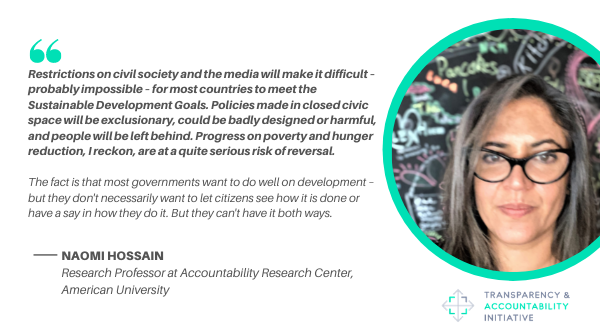
A group of us recently researched how closing civic space impacts development: it is really hard to quantify this, so many policy folks don’t pay attention. But restrictions on civil society and the media will make it difficult – probably impossible – for most countries to meet the Sustainable Development Goals. Policies made in closed civic space will be exclusionary, could be badly designed or harmful, and people will be left behind. Progress on poverty and hunger reduction, I reckon, are at a quite serious risk of reversal.
In Bangladesh, I am currently working with the BRAC Institute of Governance and Development on a study that shows why transparency, accountability, and participation are critical for better COVID-19 responses. The fact is that most governments want to do well on development – but they don’t necessarily want to let citizens see how it is done or have a say in how they do it. But they can’t have it both ways.
Bangladesh recently ‘graduated’ from Least Developed Country status as the nation celebrates its 50th anniversary. Given your interest and years of research in the country, what changes/challenges do you see going forward?
Bangladesh has made quite amazing progress on human development – it really is worth celebrating. But it is also time to reflect on why that was possible: our fastest gains came when we had a competitive democracy, media and civil society were free and flourishing, and our famous NGOs were working in the villages to find out what people needed and wanted and what worked. Economic growth may continue, but broader and more shared forms of development look more precarious. Over and again, Bangladeshis have shown that they believe in democracy and human rights – as well as development. The dominance by the ruling Awami League party has brought growth and roads – but it is not enough. People want and expect human rights and a say in the process too.
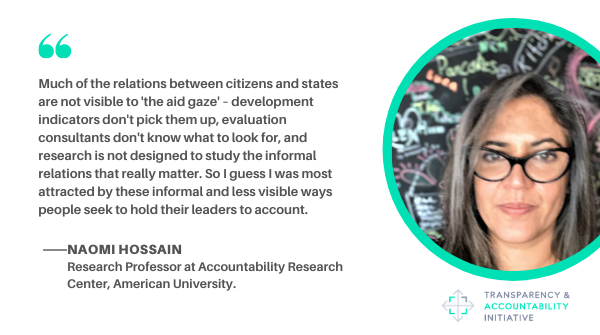 In advocating for civil society’s role in development, what have you found most effective, and what gaps are there to fill?
In advocating for civil society’s role in development, what have you found most effective, and what gaps are there to fill?
I don’t think civil society has been effective in advocating for its role in development with the political elites or even the broader population in the global South. In fact, civil society and development research have failed abysmally to make the ‘business case’ for civil society and civil and political rights. Nowhere has civil society gathered information about their collective contributions to development or tried to convince the people that their work is essential. Perhaps because civil society in development has been so dependent on bilateral aid and private foundations, and so those were their main audiences. Governments in the global South have less and less patience with Northern-funded civil society and make it harder for them to work all the time. There is a crying need for civil society to make a case for their value and role in society. And while people do want free speech and the right to choose their leaders, they also want public services, to be protected against disasters and pandemics, etc. Civil society groups need to show why their work matters to people’s everyday lives and work collectively to protect their space from jealous governments. CSOs could also do much more to legitimate themselves with the communities and peoples they are supposed to serve – being more serious about listening to them and representing their concerns.
To young women looking to break the glass ceiling, what personal stories/ advice can you share to encourage them to follow their dreams and be more active in the development process?
It may be hard for anyone who knows me to believe now, but once upon a time, I found it difficult to speak up. I was worried about saying something stupid or wrong, and it stopped me from doing and writing and saying things I should have. And people, I mean men, often instruct women not to say or write things they don’t like: this was certainly my experience. If you are being silenced by more powerful people, you are likely saying something that needs saying. I have found that being more vocal has only helped me professionally – even if I do sometimes say the wrong thing.
If you could go back in time, what year would you travel to and why?
1971! The year Bangladesh won its liberation after a long struggle! And I would get tickets for George Harrison’s Concert for Bangladesh to hear Ravi Shankar and Bob Dylan and the lovely George himself.
Love to hear more from Naomi? Catch up with her on Twitter at @nomhossain

